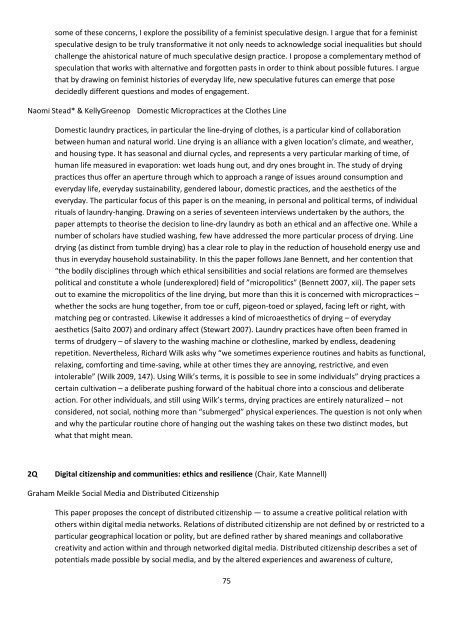Crossroads in Cultural Studies Conference 14-17th December 2016 Program Index
Crossroads-2016-final-draft-program-30-Nov
Crossroads-2016-final-draft-program-30-Nov
You also want an ePaper? Increase the reach of your titles
YUMPU automatically turns print PDFs into web optimized ePapers that Google loves.
some of these concerns, I explore the possibility of a fem<strong>in</strong>ist speculative design. I argue that for a fem<strong>in</strong>ist<br />
speculative design to be truly transformative it not only needs to acknowledge social <strong>in</strong>equalities but should<br />
challenge the ahistorical nature of much speculative design practice. I propose a complementary method of<br />
speculation that works with alternative and forgotten pasts <strong>in</strong> order to th<strong>in</strong>k about possible futures. I argue<br />
that by draw<strong>in</strong>g on fem<strong>in</strong>ist histories of everyday life, new speculative futures can emerge that pose<br />
decidedly different questions and modes of engagement.<br />
Naomi Stead* & KellyGreenop Domestic Micropractices at the Clothes L<strong>in</strong>e<br />
Domestic laundry practices, <strong>in</strong> particular the l<strong>in</strong>e-dry<strong>in</strong>g of clothes, is a particular k<strong>in</strong>d of collaboration<br />
between human and natural world. L<strong>in</strong>e dry<strong>in</strong>g is an alliance with a given location’s climate, and weather,<br />
and hous<strong>in</strong>g type. It has seasonal and diurnal cycles, and represents a very particular mark<strong>in</strong>g of time, of<br />
human life measured <strong>in</strong> evaporation: wet loads hung out, and dry ones brought <strong>in</strong>. The study of dry<strong>in</strong>g<br />
practices thus offer an aperture through which to approach a range of issues around consumption and<br />
everyday life, everyday susta<strong>in</strong>ability, gendered labour, domestic practices, and the aesthetics of the<br />
everyday. The particular focus of this paper is on the mean<strong>in</strong>g, <strong>in</strong> personal and political terms, of <strong>in</strong>dividual<br />
rituals of laundry-hang<strong>in</strong>g. Draw<strong>in</strong>g on a series of seventeen <strong>in</strong>terviews undertaken by the authors, the<br />
paper attempts to theorise the decision to l<strong>in</strong>e-dry laundry as both an ethical and an affective one. While a<br />
number of scholars have studied wash<strong>in</strong>g, few have addressed the more particular process of dry<strong>in</strong>g. L<strong>in</strong>e<br />
dry<strong>in</strong>g (as dist<strong>in</strong>ct from tumble dry<strong>in</strong>g) has a clear role to play <strong>in</strong> the reduction of household energy use and<br />
thus <strong>in</strong> everyday household susta<strong>in</strong>ability. In this the paper follows Jane Bennett, and her contention that<br />
“the bodily discipl<strong>in</strong>es through which ethical sensibilities and social relations are formed are themselves<br />
political and constitute a whole (underexplored) field of ”micropolitics” (Bennett 2007, xii). The paper sets<br />
out to exam<strong>in</strong>e the micropolitics of the l<strong>in</strong>e dry<strong>in</strong>g, but more than this it is concerned with micropractices –<br />
whether the socks are hung together, from toe or cuff, pigeon-toed or splayed, fac<strong>in</strong>g left or right, with<br />
match<strong>in</strong>g peg or contrasted. Likewise it addresses a k<strong>in</strong>d of microaesthetics of dry<strong>in</strong>g – of everyday<br />
aesthetics (Saito 2007) and ord<strong>in</strong>ary affect (Stewart 2007). Laundry practices have often been framed <strong>in</strong><br />
terms of drudgery – of slavery to the wash<strong>in</strong>g mach<strong>in</strong>e or clothesl<strong>in</strong>e, marked by endless, deaden<strong>in</strong>g<br />
repetition. Nevertheless, Richard Wilk asks why “we sometimes experience rout<strong>in</strong>es and habits as functional,<br />
relax<strong>in</strong>g, comfort<strong>in</strong>g and time-sav<strong>in</strong>g, while at other times they are annoy<strong>in</strong>g, restrictive, and even<br />
<strong>in</strong>tolerable” (Wilk 2009, <strong>14</strong>7). Us<strong>in</strong>g Wilk’s terms, it is possible to see <strong>in</strong> some <strong>in</strong>dividuals” dry<strong>in</strong>g practices a<br />
certa<strong>in</strong> cultivation – a deliberate push<strong>in</strong>g forward of the habitual chore <strong>in</strong>to a conscious and deliberate<br />
action. For other <strong>in</strong>dividuals, and still us<strong>in</strong>g Wilk’s terms, dry<strong>in</strong>g practices are entirely naturalized – not<br />
considered, not social, noth<strong>in</strong>g more than “submerged” physical experiences. The question is not only when<br />
and why the particular rout<strong>in</strong>e chore of hang<strong>in</strong>g out the wash<strong>in</strong>g takes on these two dist<strong>in</strong>ct modes, but<br />
what that might mean.<br />
2Q<br />
Digital citizenship and communities: ethics and resilience (Chair, Kate Mannell)<br />
Graham Meikle Social Media and Distributed Citizenship<br />
This paper proposes the concept of distributed citizenship — to assume a creative political relation with<br />
others with<strong>in</strong> digital media networks. Relations of distributed citizenship are not def<strong>in</strong>ed by or restricted to a<br />
particular geographical location or polity, but are def<strong>in</strong>ed rather by shared mean<strong>in</strong>gs and collaborative<br />
creativity and action with<strong>in</strong> and through networked digital media. Distributed citizenship describes a set of<br />
potentials made possible by social media, and by the altered experiences and awareness of culture,<br />
75


